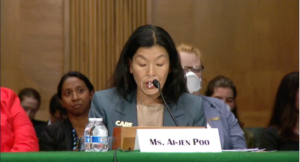Investing in care will help families, older adults, disabled people, care workers, and our economy’s growth
Washington D.C.— Today, Ai-jen Poo, President and co-founder of the National Domestic Workers Alliance (NDWA) and Executive Director of Caring Across Generations, testified before the Senate Committee on Banking, Housing, and Urban Affairs Subcommittee on Economic Policy. In her testimony, Poo outlined the urgent need to raise revenue to invest in care infrastructure, highlighting how the lack of federal support places a heavy financial burden on families, older adults, disabled people, and care workers, ultimately impacting the economy.
The hearing, titled “The Macroeconomic Impacts of Potential Tax Reform in 2025,” comes at a pivotal moment as Congress prepares for next year’s tax reform. The 2017 tax cuts overwhelmingly benefited the wealthy, offering an average tax cut of over $12,000 to those earning more than $300,000, while direct care and childcare workers saw an average cut of only $70. Families in the lowest 60% of earners received an average tax cut of less than $500—amounts that fall woefully short of covering the astronomical costs associated with care.
“We live in one of the only countries in the world without guaranteed paid family and medical leave, which means one in four moms returns to work within two weeks of giving birth. In every single state in America, center-based child care for two kids costs more than rent. A room in a nursing home will run you $100,000 per year, while aging and disability care in the home, where most people want to receive it, costs anywhere between $60,000 and $288,000 per year,” Poo shared, underlining the high cost of care. “Meanwhile, the median income for a home care worker is less than $22,000 per year. The workers whose profession it is to help care for us can’t care for their own families on the wages they earn. They also happen to be the fastest growing occupation in our entire workforce because of the tremendous need.”
Households across the nation are actively engaging in tough conversations about caregiving. Whether it’s supporting a disabled family member, or caring for an aging parent, child, sibling, or grandparent, the topic of caregiving is something we all face at some point in our lives, and right now, those conversations are centered on the continual rising costs of care. During her testimony, Poo underscored that 2025 is our once-in-a-generation moment to ensure that the wealthy pay their fair share so that we can all contribute to a strong economy and care for our families, too.
Massachusetts Senator Elizabeth Warren and the Economic Policy Subcommittee Chair emphasized during the hearing, “While other countries have invested in universal, affordable, high-quality care for their children. We have stayed in a debate over how much to cut taxes. The result? The United States ranks 31st out of 38 developed countries in terms of tax revenue as a share of GDP. And 33rd of the 37 richest nations for their spending on childcare. Childcare is more expensive than rent for the average family in America – if they can find it at all.” Senator Warren also highlighted her family’s challenges in accessing childcare.
Our economy runs on care, but the lack of investments in care, caregiving, and care workers has left millions of people across the country in overwhelming situations. Families cannot afford to pay more for care, and care workers cannot afford to get paid less.
###
Caring Across Generations is a national organization of family caregivers, care workers, disabled people, and aging adults working to transform the way we care in this country so that care is accessible, affordable, and equitable — and our systems of care enable everyone to live and age with dignity. To achieve our vision, we transform cultural norms and narratives about aging, disability, and care; win federal and state-level policies; and build power amongst the people touched by care. For more information, visit caringacross.org.
National Domestic Workers Alliance (NDWA) is the leading voice for dignity and fairness for millions of domestic workers in the United States. Founded in 2007, NDWA works for respect, recognition and inclusion in labor protections for domestic workers, the majority of whom are immigrants and women of color. NDWA is powered by over 70 affiliate organizations and local chapters and by a growing membership base of nannies, house cleaners and care workers in over 20 states. Learn more at www.domesticworkers.org. NDWA is a non-partisan non-profit organization that does not endorse, support, or oppose any candidates for public office.
